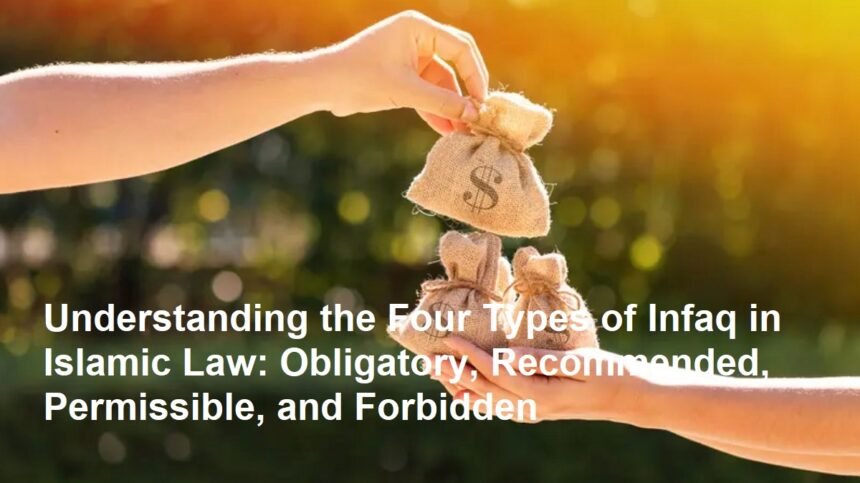In Islam, infaq (spending in the way of Allah) is a core principle of charity and social responsibility. Rooted in Quranic teachings and prophetic traditions, infaq transcends mere financial donation—it embodies a spiritual act of worship that purifies wealth and strengthens communities. However, not all forms of infaq are the same. Islamic jurisprudence categorizes infaq into four types based on their legal rulings (hukum): obligatory, Sunnah (recommended), mubah (permissible), and haram (forbidden). Understanding these distinctions ensures Muslims fulfill their duties while avoiding misuse of resources.
- Infaq Wajib (Obligatory Spending)
Definition: Infaq wajib refers to mandatory expenditures required by Islamic law. Failure to fulfill these obligations without valid reasons is considered sinful.
Basis: The Quran explicitly commands obligatory spending, such as in Surah Al-Baqarah (2:267): “O you who believe, spend from the good things you have earned…”
Examples:
- Zakat: The annual almsgiving of 2.5% on savings and specific assets (gold, livestock, etc.).
- Nafaqah: Financial support for family members, including spouses, children, and parents.
- Kaffarah: Compensatory payments for broken oaths or missed fasts during Ramadan.
Purpose: Infaq wajib ensures wealth redistribution, protects societal welfare, and upholds familial responsibilities. It is non-negotiable and prioritized over voluntary charity.
- Infaq Sunnah (Recommended Spending)
Definition: Infaq sunnah refers to voluntary acts of charity encouraged by the Prophet Muhammad (PBUH). While not obligatory, these deeds yield spiritual rewards and reflect one’s devotion.
Basis: The Quran praises voluntary charity in Surah Al-Imran (3:92): “Never will you attain righteousness until you spend from what you love…”
Examples:
- Sadaqah: Donations to the poor, funding mosques, or supporting education.
- Feeding the Hungry: Providing meals during Ramadan or to neighbors in need.
- Gifts: Offering presents to strengthen bonds within the community.
Purpose: Infaq sunnah cultivates generosity, empathy, and gratitude. It complements obligatory acts and elevates one’s spiritual status. The Prophet (PBUH) said, “Charity extinguishes sin as water extinguishes fire” (Tirmidhi).
- Infaq Mubah (Permissible Spending)
Definition: Infaq mubah refers to expenditures that are neither rewarded nor condemned by Islamic law. These acts are neutral but must align with broader ethical guidelines.
Basis: Islam permits Muslims to enjoy their wealth responsibly, as stated in Surah Al-A’raf (7:32): “Who has forbidden the adornment of Allah which He has produced for His servants and the good [lawful] things of provision?”
Examples:
- Personal luxuries (e.g., buying a car, renovating a home).
- Spending on hobbies or leisure activities, provided they are halal.
- Business investments that benefit the individual without harming society.
Purpose: Infaq mubah acknowledges human needs for comfort and enjoyment. However, excessiveness (israf) or neglecting obligatory/sunnah infaq can shift mubah acts into discouraged territory.
- Infaq Haram (Forbidden Spending)
Definition: Infaq haram involves using wealth for purposes explicitly prohibited in Islam. Such acts incur sin and negate the spiritual benefits of charity.
Basis: The Quran warns against supporting harm in Surah Al-Baqarah (2:195): “And do not throw yourselves into destruction…”
Examples:
- Funding haram activities (e.g., alcohol production, gambling dens).
- Donating to organizations promoting violence, oppression, or vice.
- Extravagant spending on sinful luxuries (e.g., gold-plated decor for vanity).
Purpose: This category safeguards societal morality. Even if intentions seem “charitable,” supporting harm violates the essence of infaq. The Prophet (PBUH) warned, “Every good deed is charity, but withholding evil is also charity” (Muslim).
Balancing the Types: Ethical and Practical Implications
Islamic law emphasizes intentionality (niyyah) in infaq. For instance, obligatory spending must be prioritized, while recommended acts enhance one’s faith. Permissible expenditures require mindfulness to avoid excess, and forbidden acts demand vigilance. A well-known Hadith states, “The best charity is that given when you are healthy and greedy, fearing poverty and hoping to become rich” (Bukhari), highlighting the virtue of giving despite personal desires.
Case Study: A businessman paying zakat (wajib), donating to an orphanage (sunnah), expanding his halal business (mubah), but avoiding investments in interest-based banks (haram) exemplifies balanced infaq.
Infaq is a dynamic concept in Islam, governed by divine principles that promote justice and compassion. By distinguishing between wajib, sunnah, mubah, and haram, Muslims align their spending with ethical and spiritual goals. Obligatory acts maintain social equity, recommended deeds nurture piety, permissible choices allow lawful enjoyment, and forbidden expenditures protect collective morality. In a world where wealth can empower or corrupt, understanding these categories ensures that every dollar spent becomes an act of worship. As the Quran reminds, “Whatever you spend of good is for Allah…” (2:272).












